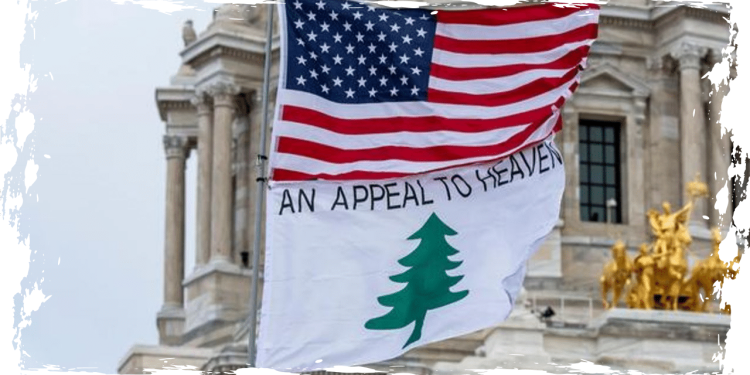In light of recent reports by the New York Times, Democrats Durbin and Whitehouse have made a request regarding the display of flags at Justice Samuel Alito’s residences. These reports revealed that an upside-down flag was flown outside his Virginia home in January 2021, while an “Appeal to Heaven” flag was displayed at his New Jersey vacation home in the summer of 2023.
Durbin and Whitehouse argued that Justice Alito’s display of the upside-down and ‘Appeal to Heaven’ flags outside his homes constituted an active participation in political activity. They further claimed that this action failed to prevent the appearance of impropriety and did not contribute to promoting public confidence in the impartiality of the judiciary.
The Democratic senators argued that the flags being present raised legitimate concerns about his ability to remain impartial and fulfill his responsibilities in the cases related to the election and January incidents.
“They wrote that his recusal in these matters is both necessary and required.”
Senators Durbin and Whitehouse have once again emphasized the need for the Supreme Court to implement a code of conduct that can be enforced for its justices. They have also expressed their desire to meet with Chief Justice Roberts at the earliest convenience to discuss measures that can be taken to tackle the ongoing ethics crisis within the Supreme Court.
The Democrats expressed their determination to address the ongoing ethical crisis until the court and the Judicial Conference take significant action. They emphasized their commitment to enacting legislation as a means to resolve this pressing issue.
In November, the Supreme Court embraced a collection of ethics principles in response to revelations about trips that Justice Clarence Thomas and Alito had accepted from affluent Republican donors. Surprisingly, these excursions were not disclosed in their financial reports. Nonetheless, both justices contended that they did not consider it necessary to publicly report these trips.
The high court’s code of conduct lacks an enforcement mechanism, and Senate Democrats are advocating for legislation that would mandate the Supreme Court to adopt binding ethics rules. This proposed legislation is set to be discussed by the full Senate.
Last week, the New York Times published its initial report on the controversy surrounding Justice Alito and the upside-down American flag displayed outside his Virginia residence earlier this year. The display of an upside-down flag is commonly understood as a distress signal.
In a statement to the Times, he made it clear that he had no part in displaying the flag outside his residence. He explained that Mrs. Alito briefly placed it there in response to a neighbor using offensive language on yard signs.
According to a recent report by The Times, last summer, the “Appeal to Heaven flag, also known as the Pine Tree flag,” was spotted outside his vacation home in New Jersey.
During the American Revolution, the flag held great significance as a symbol of resistance against British colonization. In fact, it was proudly flown “on the seas as the ensign of the cruisers commissioned by General Washington,” as stated in a congressional report from 2006. The phrase “appeal to heaven” itself originated from the writings of the 17th-century philosopher John Locke in his Second Treatise of Government.
The “Appeal to Heaven” flag request for comment from the Supreme Court was not returned.
Justice Alito has faced pressure from Democrats to recuse himself from another case this term, which deals with the constitutionality of an obscure tax. In December, the case was heard by the Supreme Court, and during that time, Alito participated in interviews with a Wall Street Journal editor and the lawyer representing the couple involved in the tax case. Despite the calls for him to step aside, Alito firmly rejected the notion and stated that there was “no valid reason” for his recusal.










